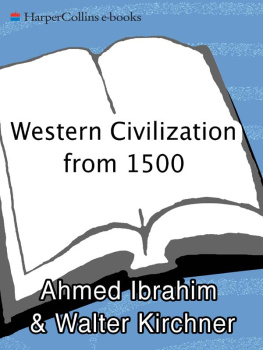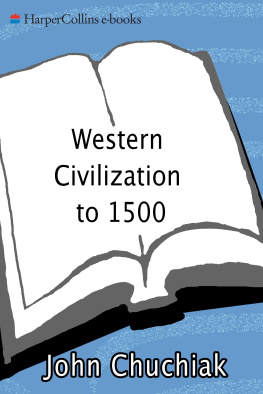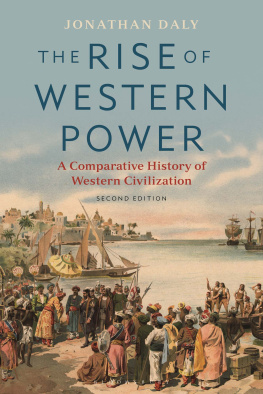Western Civilization From 1500
4th Edition
Ahmed H. Ibrahim, Ph.D.
Missouri State University
Springfield, MO
Walther Kirchner, Ph.D.
Contributing Editor
Chad Ross, Ph.D.
University of Missouri
Columbia, MO

WESTERN CIVILIZATION FROM 1500. (Fourth Edition.) Copyright 1958, 1966 by Harper & Row, Publisher, Inc. Copyright 1975 by Walter Kirchner. Copyright 1991, 2007 by HarperCollins Publishers. All rights reserved under International and Pan-American Copyright Conventions. By payment of the required fees, you have been granted the nonexclusive, nontransferable right to access and read the text of this ebook on-screen. No part of this text may be reproduced, transmitted, downloaded, decompiled, reverse-engineered, or stored in or introduced into any information storage and retrieval system, in any form or by any means, whether electronic or mechanical, now known or hereinafter invented, without the express written permission of HarperCollins ebooks.
An American Book Works Corporation Production
Library of Congress Cataloging-in-Publication Data
Ibrahim, Ahmed H. (Ahmed Hassan), 1957
Western civilization from 1500 / Ahmed H. Ibrahim, Walter Kirchner ; contributing editor, Chad Ross. - 4th ed.
p. cm. - (Collins college outlines series)
Includes bibliographical references and index.
ISBN: 978-0-06-088160-3
ISBN-10: 0-06-088160-7
1. Civilization, WesternHistory. I. Kirchner, Walter. II. Ross, Chad. III. Title.
CB245.I27 2007
909'.09821dc22 2007060877
EPub Edition AUGUST 2011 ISBN: 978-0-06-211518-8
07 08 09 10 11 CW 10 9 8 7 6 5 4 3 2 1
Contents
The Ancient World: Foundation of the West
The Medieval Heritage
The Beginning of The Modern Age (14921517)
The New Monarchies (14551519)
The Age of the Reformation (15171555)
The Aftermath of Renaissance and Reformation (15551603)
The Emergence of the Modern State System (16031648)
The Age of Louis XIV (16431715)
The Age of Enlightenment (17151774)
The Age of Revolution (17751795)
The Napoleonic Era (17951815)
Nationalism, Liberalism, Industrialism (18151830)
Society, Arts, and Sciences (18151848)
The Bourgeois Era and Revolution (18301848)
Political Reorganization (18481870)
Revaluation of Values (18481870)
The Era of Bismarck (18701890)
Economic and Cultural Trends (18701914)
The Road to World War I (18901914)
War, Peace, and Revolution (19141919)
The Twilight of Liberalism (19211929)
Depression, Fascism, and War (19291945)
The Postwar Era (19471967)
A World in Transition (19681984)
The End of the Cold War and the New Challenges (1985-Present)
Walther Kirchners Western Civilization from 1500 has been, for many years, among the most important supplemental works in the study of Western civilization. Since it first appeared in 1958, it has gone through three editions, which were published in 1966, 1975 and 1991. After Professor Kirchners death in June 2004, I completed work on this fourth edition.
For the fourth edition, I have made many changes affecting almost every chapter. Many significant events have taken place in many Western societies since the early 1990s, and coverage of these affairs has been added. Further, new research regarding earlier times has been incorporated into each chapter. Since a variety of highquality materials addressing the history of Western civilization since 1500 continue to appear in great abundance, I have expanded the bibliographic references found at the end of each chapter to accommodate the most recent general studies and monographs dealing with this topic. Despite the additions and changes, the total length of the work, 25 chapters, is about the same as the previous edition. Each chapter includes a brief introduction, a general perspective, and a test-yourself question-and-answer section. In addition, this fourth edition makes maps of previous editions clearer and more effective and adds numerous new ones.
To better understand key developments in the past five centuries, I have been careful to avoid superficial generalizations that oversimplify historical periods and transitions. I have attempted to state and interpret as many facts as possible, given the space, in order to provide students with a frame of reference within which to comprehend the principal events and eras in Western history.
I am very grateful to the many friends and family members who have provided encouragement and support during the time needed to complete this project. In particular, my thanks go to Marina G. Ibrahim, John Chuchiak, and Dale Streeter. I also would like to thank Fred Grayson of the American BookWorks Corporation, for inviting me to undertake this project.
I hope that this fourth edition will be as useful to students and general readers as earlier editions have been. In this way, the memory of Walther Kirchner will be commemorated.
Ahmed H. Ibrahim
Springfield, Missouri
Summer 2006
The Ancient World:
Foundation of the West
ca.720 B.C.E. Homer, Iliad
ca.680 B.C.E. Homer, Odyssey
ca.470-399 B.C.E Socrates
ca.450-420 B.C.E Herodotus, Histories
ca.428-347 B.C.E Plato
ca.420-400 B.C.E. Thucydides, History of the Peloponnesian War
ca.384-322 B.C.E. Aristotle
264 B.C.E. All of Italy under Roman control
ca.106-43 B.C.E. Cicero, the greatest Latinorator
27 B.C.E.-14 C.E. Cesar Augustuss rule
121 C.E.-180 C.E. Marcus Aureliuss rule
476 C.E. Fall of Western Roman Empire
The Modern Age begins around 1500 C.E. Historians generally date it from the year 1492 C.E. By then, Western civilization had undergone an evolution of more than five thousand years. Great empires and civilizations had arisenand disappeared. Egyptians, Babylonians, Hittites, Assyrians, Persians, Hebrews, Phoenicians, Etruscans, Greeks, and Romans had acted on the stage of Western history. All of them had flourished in the same comparatively small area, restricted to lands that surrounded the eastern Mediterranean basin and extended eastward to India and the valley of the Tigris and Euphrates rivers. Geographic links connected the various peoples; their commercial enterprises, religious beliefs, artistic creations, and political fates were interwoven. The inventions and achievements of each civilization nourished the thought and the work of civilizations that came after it
Time has annihilated most of what they produced. Our knowledge of the oldest precursors of Western civilization has increased, however, owing to the recent work of archaeologists. Yet any direct impact of the Egyptians and Babylonians, Persians and Phoenicians, or Hittites and Etruscans is hard to find because there are few surviving monuments. Only indirectly has their legacy been preserved. These older cultures affected the Greeks and Romans and, through them, modern Western civilization. Even the influence of the Hebrews can be seen only indirectly, chiefly in the ethical principles that have come down to us through Christianity.

Figure 1-l The major Greek City States during the Peloponnesian Wars

GREEK CONTRIBUTIONS TO MODERN WESTERN CIVILIZATION
The influence of the ancient Greeks can be felt directly in almost all facets of modern life. Greek culture has had a major impact on Western civilization.
Next page














 GREEK CONTRIBUTIONS TO MODERN WESTERN CIVILIZATION
GREEK CONTRIBUTIONS TO MODERN WESTERN CIVILIZATION